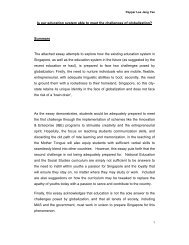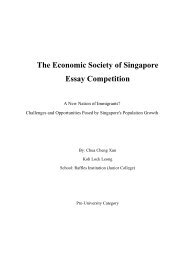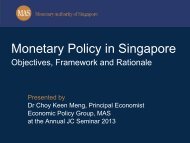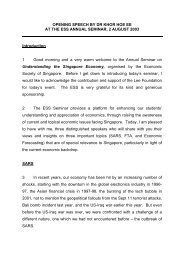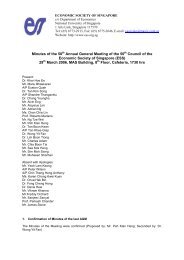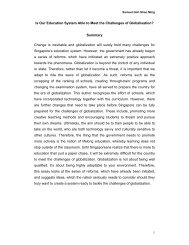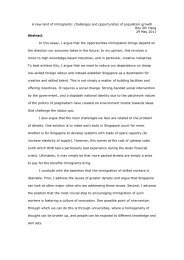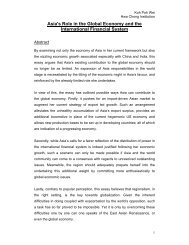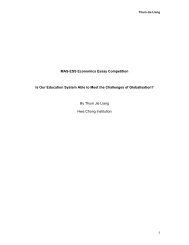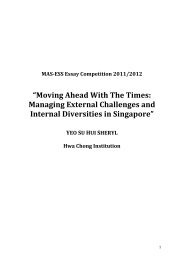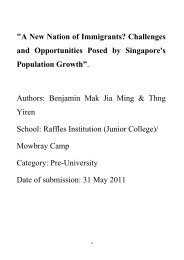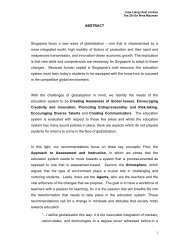the role of the state in an increasingly borderless world - Economic ...
the role of the state in an increasingly borderless world - Economic ...
the role of the state in an increasingly borderless world - Economic ...
- No tags were found...
Create successful ePaper yourself
Turn your PDF publications into a flip-book with our unique Google optimized e-Paper software.
1. Introduction<br />
Globalization, or <strong>the</strong> <strong>in</strong>tegration <strong>of</strong> <strong>the</strong> countries <strong>of</strong> <strong>the</strong> <strong>world</strong> <strong>in</strong>to a s<strong>in</strong>gle homogeneous<br />
community, is tak<strong>in</strong>g place across a broad spectrum <strong>of</strong> hum<strong>an</strong> activities. Globalization is <strong>an</strong><br />
irresistible <strong>an</strong>d relentless phenomenon touch<strong>in</strong>g <strong>an</strong>d reshap<strong>in</strong>g almost all aspects <strong>of</strong> our<br />
everyday lives. In <strong>the</strong> political arena, for example, multiparty democracy <strong>an</strong>d ideological<br />
pluralism are ga<strong>in</strong><strong>in</strong>g a foothold <strong>an</strong>d establish<strong>in</strong>g <strong>the</strong>mselves <strong>in</strong> m<strong>an</strong>y countries that used to<br />
have more authoritari<strong>an</strong> political systems. Likewise, we f<strong>in</strong>d ourselves exposed to foreign<br />
culture to <strong>the</strong> extent that listen<strong>in</strong>g to foreign music or watch<strong>in</strong>g foreign movies or d<strong>in</strong><strong>in</strong>g out at<br />
restaur<strong>an</strong>ts serv<strong>in</strong>g foreign cuis<strong>in</strong>e has become second nature to most <strong>of</strong> us, as has visit<strong>in</strong>g<br />
foreign countries or see<strong>in</strong>g foreign visitors w<strong>an</strong>der<strong>in</strong>g around our streets. In fact, with<br />
globalization proceed<strong>in</strong>g full steam ahead, <strong>the</strong> dist<strong>in</strong>ction between foreign <strong>an</strong>d homemade<br />
becomes less me<strong>an</strong><strong>in</strong>gful by <strong>the</strong> day.<br />
In this essay, we look at one component <strong>of</strong> globalization, namely economic globalization,<br />
which refers to <strong>the</strong> rapid recent growth <strong>of</strong> <strong>in</strong>ternational trade <strong>in</strong> goods <strong>an</strong>d services, as well as<br />
<strong>in</strong>ternational flows <strong>of</strong> capital <strong>an</strong>d to a lesser extent, labor. <strong>Economic</strong> globalization, or global<br />
economic <strong>in</strong>tegration, thus implies <strong>the</strong> progressive removal <strong>of</strong> barriers to <strong>the</strong> movement <strong>of</strong><br />
goods <strong>an</strong>d services, capital, <strong>an</strong>d labor across countries. That is to say, economic globalization<br />
denotes <strong>the</strong> process whereby <strong>the</strong> national economies <strong>of</strong> <strong>the</strong> <strong>world</strong> are mov<strong>in</strong>g toward a s<strong>in</strong>gle<br />
economy with unfettered movement <strong>of</strong> goods <strong>an</strong>d productive factors. While we still have long<br />
way to go to achieve a truly <strong>borderless</strong> global economy, <strong>the</strong> acceleration <strong>of</strong> <strong>in</strong>ternational trade<br />
<strong>an</strong>d capital flows <strong>in</strong> <strong>the</strong> postwar era suggests a clear movement toward ra<strong>the</strong>r th<strong>an</strong> away from<br />
that k<strong>in</strong>d <strong>of</strong> <strong>an</strong> economy. <strong>Economic</strong> globalization entails far-reach<strong>in</strong>g repercussions for<br />
<strong>in</strong>dividuals <strong>an</strong>d firms as well as <strong>the</strong> <strong>state</strong>.<br />
Our focus here is on <strong>the</strong> impact <strong>of</strong> economic globalization on <strong>the</strong> <strong>role</strong> <strong>of</strong> <strong>the</strong> <strong>state</strong> or <strong>the</strong><br />
government. Although <strong>the</strong> private sector tends to determ<strong>in</strong>e <strong>the</strong> allocation <strong>of</strong> resources <strong>in</strong><br />
market economies, <strong>the</strong> <strong>state</strong> cont<strong>in</strong>ues to play a signific<strong>an</strong>t economic <strong>role</strong> <strong>in</strong> those economies.<br />
Although <strong>the</strong> extent to which <strong>the</strong> <strong>state</strong> <strong>in</strong>tervenes <strong>in</strong> <strong>the</strong> economy varies subst<strong>an</strong>tially from<br />
country to country, <strong>the</strong> <strong>in</strong>visible h<strong>an</strong>d <strong>of</strong> market forces has yet to completely displace <strong>the</strong> more<br />
visible h<strong>an</strong>d <strong>of</strong> <strong>the</strong> <strong>state</strong> even <strong>in</strong> <strong>the</strong> most laissez faire economies.<br />
As we will see below, economic globalization has signific<strong>an</strong>t implications for <strong>the</strong> <strong>role</strong> <strong>of</strong><br />
<strong>the</strong> <strong>state</strong>. <strong>Economic</strong> globalization creates both excit<strong>in</strong>g opportunities <strong>an</strong>d serious challenges for<br />
national economies. While globalization weakens <strong>the</strong> government <strong>in</strong> some respects, <strong>the</strong><br />
government <strong>an</strong>d its policies help determ<strong>in</strong>e a national economy’s ability to maximize its returns<br />
<strong>an</strong>d m<strong>in</strong>imize its risks from globalization. Put differently, <strong>the</strong> impact <strong>of</strong> globalization on a<br />
country’s firms <strong>an</strong>d <strong>in</strong>dividuals depends critically on how <strong>the</strong>ir government responds to<br />
globalization.<br />
2. <strong>Economic</strong> Globalization, Factor Mobility, <strong>an</strong>d The Disappear<strong>in</strong>g State<br />
An especially notable loss <strong>of</strong> <strong>the</strong> government’s power <strong>in</strong> <strong>the</strong> face <strong>of</strong> globalization<br />
concerns taxes. Although <strong>the</strong> <strong>state</strong> c<strong>an</strong> borrow or resort to <strong>in</strong>flation as a me<strong>an</strong>s <strong>of</strong> f<strong>in</strong><strong>an</strong>c<strong>in</strong>g<br />
itself <strong>in</strong> <strong>the</strong> short run, taxes are its primary source <strong>of</strong> resources <strong>in</strong> <strong>the</strong> long run. As such, <strong>an</strong>y<br />
reduction <strong>in</strong> <strong>the</strong> <strong>state</strong>’s ability to collect taxes from firms <strong>an</strong>d <strong>in</strong>dividuals tr<strong>an</strong>slates directly <strong>in</strong>to a<br />
general loss <strong>of</strong> its ability to produce services. Accord<strong>in</strong>g to conventional wisdom, economic<br />
globalization renders <strong>the</strong> <strong>state</strong> less powerful at best <strong>an</strong>d irrelev<strong>an</strong>t at worst by limit<strong>in</strong>g <strong>the</strong> <strong>state</strong>’s<br />
ability to collect taxes <strong>an</strong>d thus f<strong>in</strong><strong>an</strong>ce its activities.<br />
The <strong>in</strong>tuition is quite straightforward. As <strong>in</strong>dicated earlier, economic globalization does<br />
not only entail greater cross-border flows <strong>of</strong> goods <strong>an</strong>d services, but factors <strong>of</strong> production such<br />
as capital <strong>an</strong>d labor as well. Greater mobility <strong>of</strong> productive factors does not bode well for <strong>the</strong><br />
future <strong>of</strong> taxes <strong>an</strong>d by implication, <strong>the</strong> <strong>state</strong>, s<strong>in</strong>ce capital <strong>an</strong>d labor will gravitate toward national<br />
36



